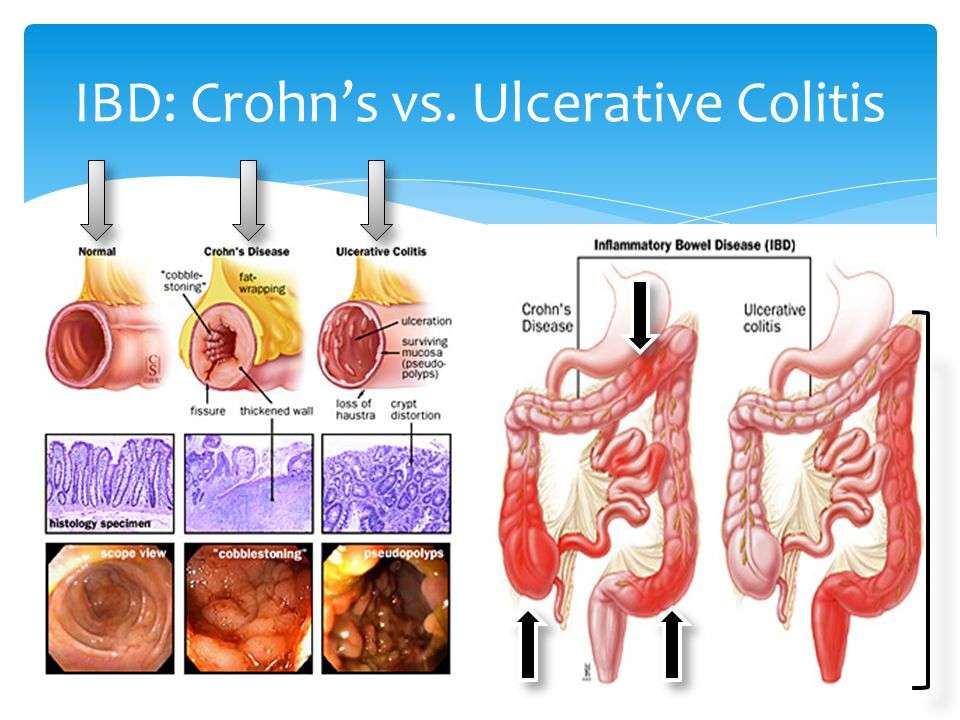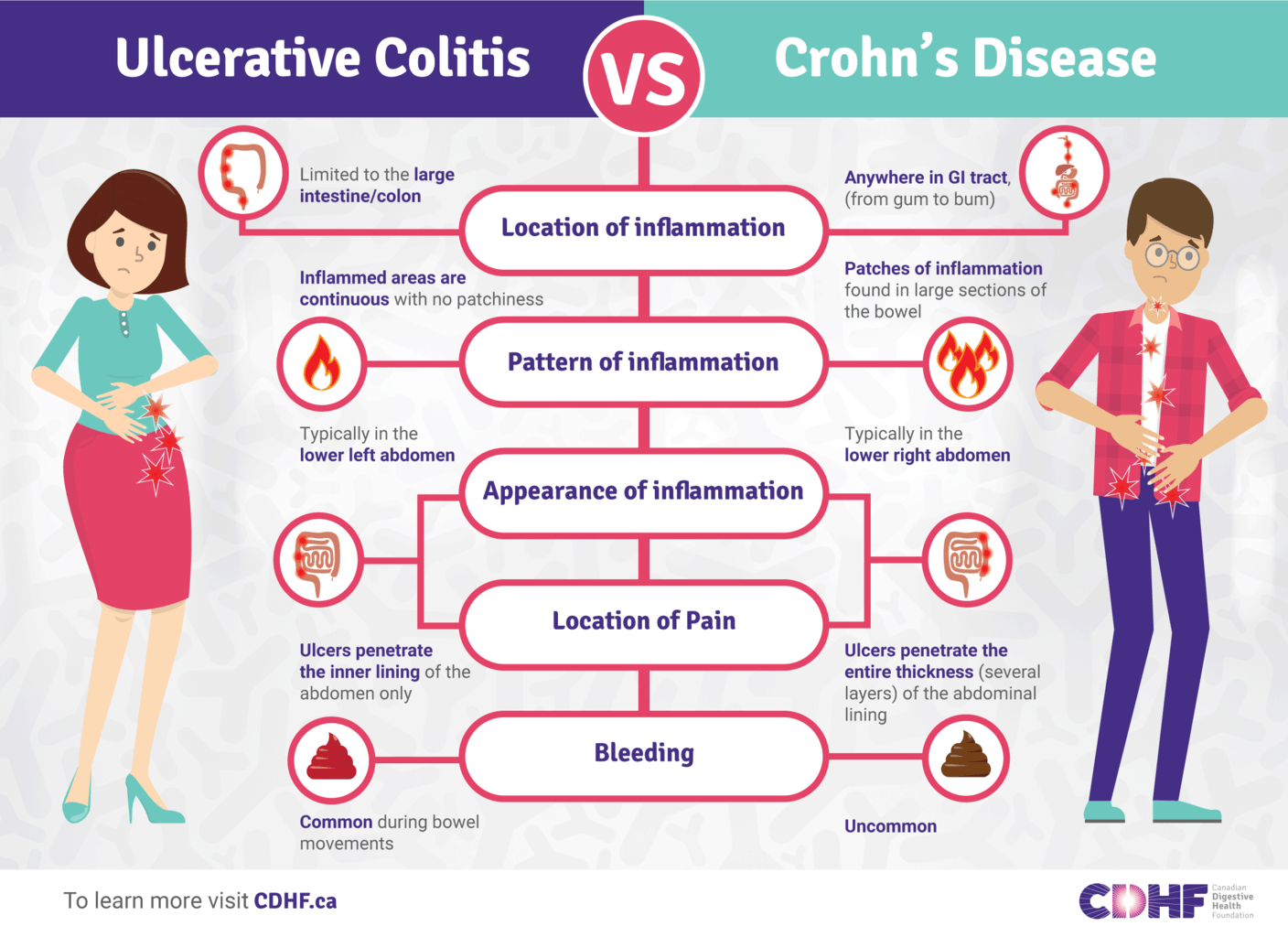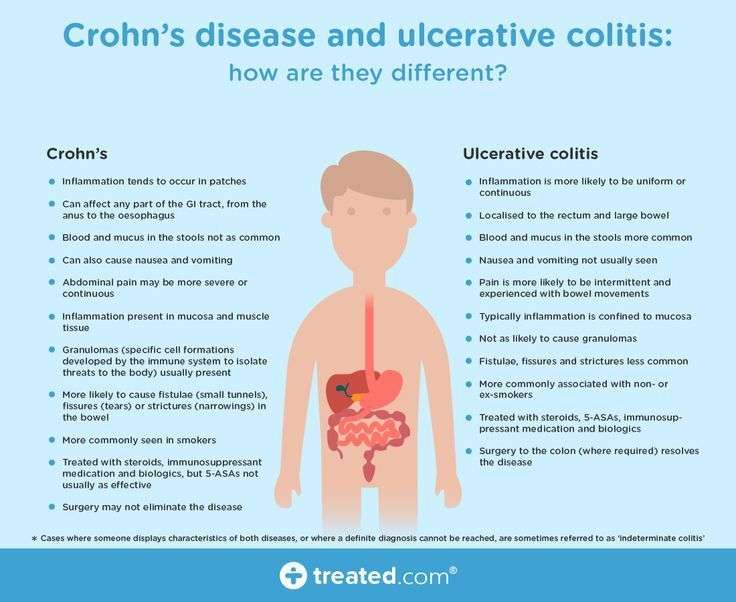Causes Of Ulcerative Colitis And Crohns Disease
There are multiple contributing risk factors that can lead to ulcerative colitis and Crohns. Evidence does suggest that both are associated with an inappropriate immune response, which can arise from many different environmental factors, gut microbiome imbalance, as well as genetics .
The body creates temporary inflammation as part of a normal immune system response to threats and foreigners that may cause harm. An inappropriate immune response occurs when the immune system attacks something that is probably not harmful or overreacts to a possible pathogen. This creates unnecessary or excessive inflammation that can become chronic inflammation.
For example, in addition to toxins and infections, the immune system may attack food particles, beneficial gut bacteria, and, in the case of ulcerative colitis and Crohns disease, the lining of the digestive tract [1
What might be causing the inflammation of the digestive tract and an inappropriate immune response?
Some of the contributing factors in IBD are:
What Are Nonsurgical Inflammatory Bowel Disease Treatments
IBD treatments vary depending on the particular type and symptoms. Medications can help control inflammation so you dont have symptoms . Medications to treat IBD include:
- Aminosalicylates minimize irritation to the intestines.
- Antibiotics treat infections and abscesses.
- Biologics interrupt signals from the immune system that cause inflammation.
- Corticosteroids, such as prednisone, keep the immune system in check and manage flares.
- Immunomodulators calm an overactive immune system.
You may also benefit from these over-the-counter IBD treatments:
- Antidiarrheal medication.
- Vitamins and supplements like probiotics.
Infectious Triggers To Inflammatory Bowel Conditions
There are a few distinct ways that a shift in your gut microbiome can contribute to the widespread inflammation seen in both Crohns disease and ulcerative colitis. These include:
- Dysbiosis: This occurs when there is a modification in the composition of microbes that reside in your gut with an imbalance between between beneficial and harmful bacteria
- Excessive bacterial translocation: This is caused by a disruption in the function of your intestinal barrier allowing gut bacteria to mistakenly migrate through the gut wall and inflame surrounding tissues.
- Persistence of a pathogen: Invading bacteria and viruses can adhere to epithelial cells where they survive and proliferate while using your own cells as protection against your immune system. These persistent pathogens induce inflammation and disrupt the function of your intestinal lining that acts as a selective barrier.
Oftentimes, the inflammation seen in Crohns and ulcerative colitis can be caused by a combination of these 3 underlying infectious triggers creating a vicious cycle of inflammation.
Now lets explore our final inflammatory bowel condition celiac disease.
Don’t Miss: Can Ulcerative Colitis Lead To Crohn Disease
About Harvard Medical School Guides
Harvard Medical School Guides delivers compact, practical information on important health concerns. These publications are smaller in scope than our Special Health Reports, but they are written in the same clear, easy-to-understand language, and they provide the authoritative health advice you expect from Harvard Health Publishing.
- What is IBD?
- Causes and risk factors of IBD
- Complications of IBD
What Causes Crohns Illness And Who Will Get It

Like all varieties of IBD, consultants still dont know what causes Crohns illness. It is perhaps in response to an autoimmune response the place your immune system assaults wholesome cells in your physique however medical doctors dont know for positive.
In keeping with the National Institute of Diabetes and Digestive and Kidney Diseases chances are youll be extra in danger based mostly on:
- genetics
Also Check: Do Enemas Help Ulcerative Colitis
Ischemic Colitis Treatment: Natural Remedies And Diet
Ischemic colitis is a condition characterized by a reduced blood flow to the colon. One of the main contributors to ischemic colitis is atherosclerosis, which is the narrowing of the arteries due to plaque buildup on the inner walls. Limited blood flow to the colon means decreased supply of oxygen to the cells in the digestive system.
Sometimes mistaken for other digestive issues, ischemic colitis can heal on its own or turn into an infection, which can be prevented with medication. Surgery may be required if the colon gets damaged.Natural remedies and diet can be effectively used to aid in ischemic colitis treatment.
What Questions Should I Ask My Healthcare Provider
You may want to ask your healthcare provider:
- What type of IBD do I have?
- Whats the best treatment for me?
- What foods or drinks should I avoid?
- What lifestyle changes should I make?
- Am I at risk for other problems?
- Should I look out for signs of complications?
A note from Cleveland Clinic
Most people with inflammatory bowel disease enjoy active lives. Still, symptoms of Crohns disease and ulcerative colitis can be life-disrupting. Some people go into remission after taking medications. Some people need surgery to deal with severe symptom flare-ups. Your healthcare provider can suggest dietary and lifestyle changes to manage IBD.
Last reviewed by a Cleveland Clinic medical professional on 05/03/2021.
References
Recommended Reading: How Do You Cure Ulcerative Colitis
What Causes Ibd And Who Will Get It
Nobody is aware of precisely what causes IBD, nevertheless it appears to contain an irregular response by your physiques immune system.
In keeping with the Centers for Disease Control and Prevention, about 1.3 % of U.S. adults had IBD in 2015. This was a reasonably large leap from 1999, when 2 million People have been troubled.
Youre extra more likely to have IBD if you happen tore:
- over age 45
Treating Crohns And Colitis
Its important to know that neither Crohns nor ulcerative colitis can be cured, though doctors will work with patients to manage symptoms. The two illnesses are generally treated with the same types of medication, although each patient may respond differently to the same drug. The goal of treatment is to reduce the inflammation, which in turn reduces symptoms, allows your body to repair damaged tissue, and helps slow the progression of the disease.
Today, many patients get a relatively new class of drugs, called biologics, which are live antibodies that are given to patients to help their immune cells fight the inflammation. Other classes of drugs include immunomodulators, which help tamp down the immune systems inflammatory response, and aminosalicylates, the oldest class of drugs, which are used to help keep the disease in remission. According to the Crohns and Colitis Foundation, immunomodulators can take up to six months to become fully effective, so doctors usually prescribe them along with fast-acting steroids that patients will ideally go off of once the immunomodulators reach their full potential. I absolutely think that with these new drugs, its a new era in the treatment of inflammatory bowel disease, says Dr. Cohen.
Recommended Reading: What Foods To Avoid When You Have An Ulcer
Getting To A Diagnosis
Theres no doubt that IBD can significantly decrease quality of life, between uncomfortable symptoms and frequent bathroom visits. IBD can even lead to scar tissue and increase the risk of colon cancer.
If you experience any unusual symptoms, its important to call your doctor. You may be referred to a gastroenterologist for IBD testing, such as a colonoscopy, sigmoidoscopy, or a CT scan. Your doctor may also order blood and fecal testing. Diagnosing the specific form of IBD will lead to more effective therapies.
Commitment to daily treatment and lifestyle changes can help minimize symptoms, achieve remission, and avoid complications.
Regardless of your diagnosis, Healthlines free app, IBD Healthline, can connect you with people who understand. Meet others living with Crohns and ulcerative colitis through one-on-one messaging and live group discussions. Plus, youll have expert-approved information on managing IBD at your fingertips. Download the app for iPhone or Android.
Crohns Vs Ulcerative Colitis
Crohns and ulcerative colitis both have many of the same symptoms, which oftentimes gets them mistaken for the same disease. However, there are a few things that differ between these two inflammatory bowel diseases.6
- Location. Ulcerative colitis only affects the large intestine. Crohns can be anywhere in the digestive tract, from the mouth to the anus.
- Inflammation. People with Crohns will have healthy spots between spots of inflammation. People with ulcerative colitis will not.
- Areas affected. Crohns disease affects more areas throughout the whole digestive tract, which can cause other problems such as mouth sores and anal ulcers. These issues are not present in those with ulcerative colitis because only the large intestine is affected.
Also Check: Mouth Ulcer On Tongue Causes
What Causes Ulcerative Colitis
However, there are cases where the diagnosis of one form of IBD over the other is very difficult. At times, a final diagnosis is possible only after an event during the course of the disease or its treatment makes the form of IBD readily apparent.
Patients with IBD may be very confused as to the differences between these diseases. As with any chronic condition, education is an important tool to become an active participant in one’s own treatment plan.
If your diagnosis isn’t firm, don’t panic. In some people, it can take time to determine if the IBD is more like Crohn’s disease or more like ulcerative colitis. In about 5-20% of cases, people are diagnosed as having indeterminate colitis .
IBD is becoming increasingly treatable and there are now many medications in the arsenal that are helping people with all forms get greater control over their disease. The main differences between ulcerative colitis and Crohn’s disease are described below.
-
Smoking can worsen condition
Crohns Vs Ulcerative Colitis Symptoms

Crohns disease and ulcerative colitis are the two primary types of IBD and cause similar symptoms.
Crohns disease is an inflammatory bowel disease that can affect any part of your GI tract between your mouth and your anus. It typically affects the end of your small intestines or the first part of your large intestines.
Heres a look at how the most common symptoms of these two conditions typically compare.
| Ulcerative colitis |
Read Also: Foods That Irritate Stomach Ulcers
Distinguishing Between Crohns Disease And Ulcerative Colitis Signs And Symptoms
In either disease, symptoms can range from mild to severe and can even occur as flare-ups if not well managed. Although primary symptoms of Crohns disease and ulcerative colitis affect the gastrointestinal tract, other symptoms may also occur, affecting other parts of the body.
Both conditions often share the following symptoms:
- Belly cramps and pain
- Fatigue
- Night Sweats
- Problems with your period. You might skip them, or their timing might be harder to predict.
However, each has its own unique characteristics as well. Crohns disease, for example, can affect nearly any tissue found in the digestive tract, going from the mouth all the way to the anus. Ulcerative colitis, on the other hand, only affects the large colon. Inflammation is a common feature of both, but ulcerative colitis tends to have more uniform and uninterrupted lesions as opposed to Crohns disease, which can have healthy areas in between inflamed spots. Additionally, ulcerative colitis is more often associated with rectal bleeding and blood in the stool.
Differences Between Ulcerative Colitis And Crohn’s Disease
The differences between ulcerative colitis and Crohn’s disease are:
- Ulcerative colitis is limited to the colon while Crohn’s disease can occur anywhere between the mouth and the anus
- In Crohn’s disease, there are healthy parts of the intestine mixed in between inflamed areas. Ulcerative colitis, on the other hand, is continuous inflammation of the colon
- Ulcerative colitis only affects the inner most lining of the colon while Crohn’s disease can occur in all the layers of the bowel walls
You May Like: How Do You Know You Have A Stomach Ulcer
Daily Life For People With Ibd
People with IBD lead useful and productive lives, even though they need to take medications. When they are not experiencing a flare-up of their disease, they feel quite well and are often free of symptoms.People with IBD can marry, enjoy sexual activity and have children. They can hold down jobs, care for families and enjoy sport and recreational activities.Even though there is currently no cure for IBD, medical therapy has improved the health and quality of life of most people with Crohns disease and ulcerative colitis. Research underway today may lead to further improvements in medical and surgical treatment, and even a cure.
Can These Diseases Cause Hemorrhoids
With shared symptoms like diarrhea and the frequent urge to move the bowels, these two diseases can potentially cause patients to develop hemorrhoids thanks to extra pressure on the veins. If a patient is also suffering from hemorrhoids in addition to an IBD like Crohns or ulcerative colitis, the hemorrhoids should be treated carefully as they could suffer from complications.
Don’t Miss: Sample Meal Plan For Ulcerative Colitis
What Foods Can You Eat On A Ulcerative Colitis Diet
If you have ulcerative colitis you may need to modify your diet to help manage their symptoms. There is not a single diet or meal plan that fits everyone with ulcerative colitis, and diets are individualized for each patient. Depending on symptoms different types of diets may be recommended, such as:
- a high-calorie diet
What Causes Ibs And Who Will Get It
Somebody you already know fo sho has IBS, even if you happen to dont understand it. Thats as a result of IBS is amongst the most common disorders recognized by medical doctors. About 11 percent of the inhabitants worldwide and about 12 percent of individuals within the U.S. have it, although some estimates are as excessive as 20 percent.
The reason for IBS remains unknown, and theres at present no identified treatment .
These extra more likely to get IBS could embody:
These with IBS are additionally extra more likely to produce other functional disorders together with:
Recommended Reading: Blood Clots In Stool With Ulcerative Colitis
Spread Awareness During Crohns & Colitis Awareness Week
Help spread awareness about these two diseases during Crohns & Colitis Awareness Week. Many people may know of these diseases, but may not be aware of the symptoms of Crohns disease, the symptoms of ulcerative colitis, and how they differ.
If you or a loved one have experience with an inflammatory bowel disease, share your story and help educate others.
To learn more about Saber Healthcare and our services, .
Saber Healthcare is an organization dedicated to providing consultant services to long term care providers. This article is for informational purposes and is not meant to be seen as professional advice. Please consult with a medical expert before relying on the information provided.
Symptoms
Crohns Disease And Ulcerative Colitis And Digesting Food

Your mouth and stomach break down food by mechanical and chemical means. When the food has reached a pulp-like consistency, it is slowly released into the first part of the small intestine . The food is then massaged along the length of the small intestine. Organs like the pancreas and the gall bladder make digestive enzymes to further break down the food into its simpler components.
The small intestine is lined with microscopic , finger-like projections that lie close to tiny blood vessels . Nutrients pass into the bloodstream through these villi. The rest of the food is pushed into the large bowel, which absorbs excess water. The waste is then temporarily stored in the colon before it is eliminated from the anus.The two ways in which Crohns disease and ulcerative colitis disturb the digestion and absorption processes are:
- Crohns disease an inflamed ileum impairs absorption of vitamin B12 and bile salts. Inflammation along the length of the small intestine impairs absorption of all food nutrients. Inflammation of the large bowel impairs water absorption, causing diarrhoea.
- Ulcerative colitis digestion and absorption are generally not affected. Inflammation of the large bowel impairs water absorption, causing diarrhoea.
Other factors that may affect your nutritional status include:
Read Also: List Of Foods Good For Ulcers
Ulcerative Colitis Vs Crohns Disease: An Overview
Both ulcerative colitis and Crohns disease cause inflammation along the digestive tract. However, Crohns disease tends to affect different parts of the track compared to ulcerative colitis. In most cases, Crohns disease affects the ileum. This is the last part of the small and large intestine. In as many as 45% of cases, the condition affects both the small and large intestines.
Crohns disease can occur in other parts of the digestive system, except for the rectum. But, infections and other complications of the anus can develop into Crohns disease.
Ulcerative colitis only affects the large intestine and the rectum is always involved. This condition occurs in the inner layer of the colon, or mucosa, in a continuous segment of the gut. Crohns disease can involve all four layers of the gut wall and often appears in patches.
Inflammatory bowel disease currently affects all ethnic groups. However, Crohns disease and ulcerative colitis are more prevalent in Caucasians. Specifically, people of Northern European, Anglo-Saxon, or Ashkenazi Jewish descent develop the condition. Hispanics and Asians are likely to have pancolitis, a form of ulcerative colitis that affects the entire colon.
The prevalence of inflammatory bowel diseases is on the rise. In the 1990s, two million people developed a condition. Currently, three million people worldwide live with Crohns disease or ulcerative colitis.
Complications Caused By Nutritional Deficiencies
Some of the complications of malnutrition include:
- Dehydration diarrhoea causes your body to lose fluid, which can lead to dehydration. Severe dehydration can damage your kidneys.
- Anaemia reduced iron in the diet combined with losing blood from the bowel can lead to anaemia .
- Weight loss reduced appetite and poor absorption of food nutrients can cause weight loss.
- Reduced growth inadequate nutrition during childhood and adolescence can impair a childs growth and physical development.
Read Also: How To Reduce Stomach Ulcer